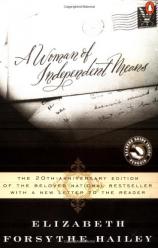A Woman of Independent Means
About the Book
A Woman of Independent Means
Domestic Feminism in A Woman of Independent Means
Elizabeth Forsythe Hailey wrote A Woman of Independent Means in 1978, when to most Americans feminism was beginning to become associated with angry politicos who neglected their femininity and were capable of shocking radicalism. This book, however, portrays a very different ideal for the capable, socially responsible woman of the Twentieth Century. The character Bess Steed Garner was partially inspired by the feminist movement of the 1970s, and partially based on the author's grandmother. When Hailey told her husband of her intention to write a novel called Letters from A Runaway Wife, he responded, "Runaway wives are a passing fad. Why don't you write about somebody who doesn't have to leave home to be liberated? Why don't you write about somebody like your grandmother?" Therefore, in the life of her heroine, Hailey portrays a domestic feminist, a woman who is not only confident about her gender's equality, but who proves it every day in her judicious maintenance of her home and finances, her unfailing support of her husbands, family, and friends, and her personal, independent engagement with the world around her. The letters that comprise this book&—both personal and business letters&—reveal that Bess's liberation is not only manifest in what she does, but in how she regards herself and her position in the various contexts of life.
Bess's first letter is dated 1899, and her last 1968. The tremendous social changes that occurred in this sixty-nine year span are reflected in the ever-evolving personality and character of Bess, who is gradually transformed from a sheltered, privileged child into a competent woman, encountering adversity with increasing intelligence, sensitivity, and courage. In 1913, Bess writes to her husband, "Last night the train sped through the heart of a forest fire, and I watched with fascination as the flames encircled but could not touch us. Sometimes my life seems as safe and insulated to me as the compartment in which I was riding last night. I see the flames of death and deprivation outside, but they do not touch me" (15). In 1916, however, those flames swept closer when Bess's daughter was hit by a car and forced to undergo a long, difficult period of hospitalization. Bess's relentlessly energetic care was probably instrumental in saving her daughter's life, while her creativity and devotion assured that Eleanor's psyche mended, as well as her body, during the long convalescence. This is the first tragedy that tests Bess's domestic heroism, but not the last. Over the next several years Bess endures the untimely deaths of her husband and eldest son, yanks a failing business back to its feet, and&—ironically&—loses her home and all of her possessions in a fire. Though her wealth eases Bess's burdens, it does not remain a protective shield that keeps the most painful realities of life at bay. Gradually one comes to feel that the "independent means" are not the social status and financial security Bess was born into, but the personal and spiritual strengths and resources she has acquired.
A Woman of Independent Means
- Publication Date: May 1, 1998
- Paperback: 304 pages
- Publisher: Penguin (Non-Classics)
- ISBN-10: 0140274367
- ISBN-13: 9780140274363









